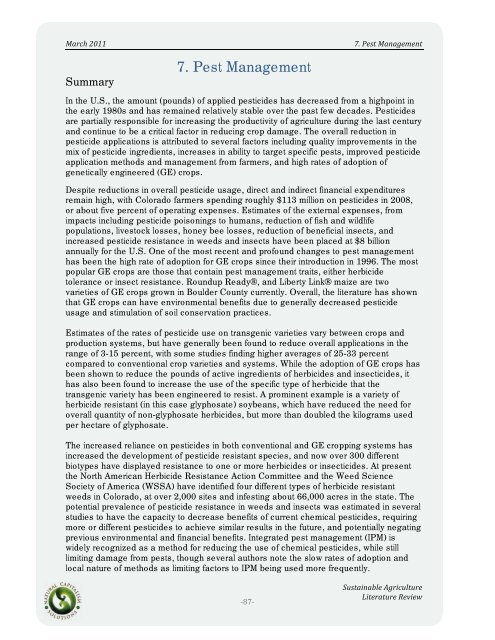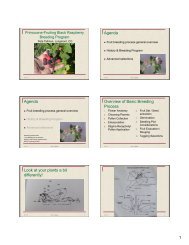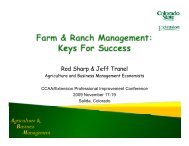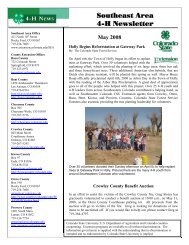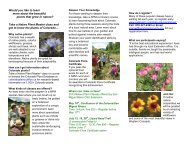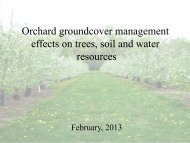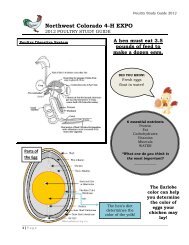Sustainable Agriculture Literature Review - Boulder County
Sustainable Agriculture Literature Review - Boulder County
Sustainable Agriculture Literature Review - Boulder County
You also want an ePaper? Increase the reach of your titles
YUMPU automatically turns print PDFs into web optimized ePapers that Google loves.
! ! !!<br />
"#$%&!'())!! !!!!!!!!!!!!!!!!!!!!!!!!!!!!!!!!!!!!!!!!!!!!!!!!!!!!!!!!!!!!!!!!@+!A142!"#5#81B152!<br />
Summary<br />
!<br />
7. Pest Management<br />
In the U.S., the amount (pounds) of applied pesticides has decreased from a highpoint in<br />
the early 1980s and has remained relatively stable over the past few decades. Pesticides<br />
are partially responsible for increasing the productivity of agriculture during the last century<br />
and continue to be a critical factor in reducing crop damage. The overall reduction in<br />
pesticide applications is attributed to several factors including quality improvements in the<br />
mix of pesticide ingredients, increases in ability to target specific pests, improved pesticide<br />
application methods and management from farmers, and high rates of adoption of<br />
genetically engineered (GE) crops.<br />
Despite reductions in overall pesticide usage, direct and indirect financial expenditures<br />
remain high, with Colorado farmers spending roughly $113 million on pesticides in 2008,<br />
or about five percent of operating expenses. Estimates of the external expenses, from<br />
impacts including pesticide poisonings to humans, reduction of fish and wildlife<br />
populations, livestock losses, honey bee losses, reduction of beneficial insects, and<br />
increased pesticide resistance in weeds and insects have been placed at $8 billion<br />
annually for the U.S. One of the most recent and profound changes to pest management<br />
has been the high rate of adoption for GE crops since their introduction in 1996. The most<br />
popular GE crops are those that contain pest management traits, either herbicide<br />
tolerance or insect resistance. Roundup Ready®, and Liberty Link® maize are two<br />
varieties of GE crops grown in <strong>Boulder</strong> <strong>County</strong> currently. Overall, the literature has shown<br />
that GE crops can have environmental benefits due to generally decreased pesticide<br />
usage and stimulation of soil conservation practices.<br />
Estimates of the rates of pesticide use on transgenic varieties vary between crops and<br />
production systems, but have generally been found to reduce overall applications in the<br />
range of 3-15 percent, with some studies finding higher averages of 25-33 percent<br />
compared to conventional crop varieties and systems. While the adoption of GE crops has<br />
been shown to reduce the pounds of active ingredients of herbicides and insecticides, it<br />
has also been found to increase the use of the specific type of herbicide that the<br />
transgenic variety has been engineered to resist. A prominent example is a variety of<br />
herbicide resistant (in this case glyphosate) soybeans, which have reduced the need for<br />
overall quantity of non-glyphosate herbicides, but more than doubled the kilograms used<br />
per hectare of glyphosate.<br />
The increased reliance on pesticides in both conventional and GE cropping systems has<br />
increased the development of pesticide resistant species, and now over 300 different<br />
biotypes have displayed resistance to one or more herbicides or insecticides. At present<br />
the North American Herbicide Resistance Action Committee and the Weed Science<br />
Society of America (WSSA) have identified four different types of herbicide resistant<br />
weeds in Colorado, at over 2,000 sites and infesting about 66,000 acres in the state. The<br />
potential prevalence of pesticide resistance in weeds and insects was estimated in several<br />
studies to have the capacity to decrease benefits of current chemical pesticides, requiring<br />
more or different pesticides to achieve similar results in the future, and potentially negating<br />
previous environmental and financial benefits. Integrated pest management (IPM) is<br />
widely recognized as a method for reducing the use of chemical pesticides, while still<br />
limiting damage from pests, though several authors note the slow rates of adoption and<br />
local nature of methods as limiting factors to IPM being used more frequently.<br />
",+"<br />
!,342#.5#6/1!78$.%3/23$1!<br />
9.21$#23$1!:1;.1


